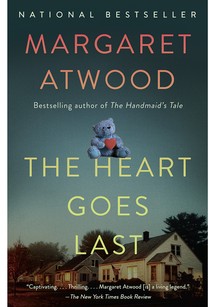The Heart Goes Last
By Margaret Atwood
400 pages;
Anchor
No living writer does dystopia with more panache than the incomparable Margaret Atwood. In her new novel, The Heart Goes Last (Nan A. Talese/Doubleday), the future has arrived in the form of an economic collapse. Things are dire, but to paraphrase author William Gibson, the direness is unevenly distributed.
Stan and Charmaine, a married couple, are among the hard-hit. They've been reduced to sleeping in their car on increasingly dangerous streets when Charmaine spots an ad for a model community. Those selected for this experiment in the town of Consilience are promised a home, employment, food—a return to safety. They apply in desperation and are accepted. But there's a catch—quite a few of them, actually. The biggest is that their new residence for half the year is the local prison, a privatized institution on which the community's financial fate depends. The food is gourmet, the carefully curated vibe is 1950s à la Doris Day and Bing Crosby, but at the end of the night the men and women retire to their respective cells, and communication with anyone outside Consilience is forbidden. Freedom has been traded for the comforts of confinement.
Improbably, given the backdrop, The Heart Goes Last has the rollicking, episodic pacing of a serialized novel, which is what much of the material once was (the first four chapters initially ran in the now-defunct online magazine Byliner). There are plots within plots, murder, mayhem, peril, and suspense; don't be alarmed by the proliferation of Elvis impersonators and hand-knit teddy bears and the pivotal role they play. There's also lots of sex, most of it ill-advised. It turns out this is a screwball comedy disguised as science fiction, more biting romp than cautionary tale. The technology is near-future; an exception is brain surgery capable of turning a human into a sex bot. The satire, almost invisible in the serious early pages, ripens as the story continues, giving Atwood the opportunity to let her unparalleled imagination unfurl.
— Karen Joy Fowler


